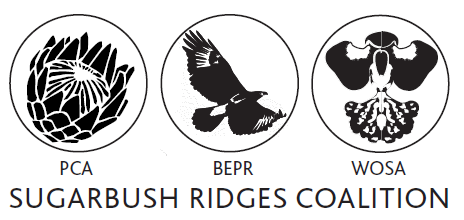WOSA 2016 Conference
The role of Civil Society in Orchid Conservation
The role of Civil Society in Orchid Conservation was the theme of the first Wild Orchids Southern Africa (WOSA) Conference held in Dullstroom on 30 January 2016. Feedback from delegates indicated that the conference was an overwhelming success, with most coming away: more aware of the real value of our indigenous orchids, having gained an understanding why they are worthy of protection and enthusiastic about getting practically involved in making a difference.
Speakers and leader group. Back row left to right. Lourens Grobler, Jane Kratz- Comms. , Kay Montgomery, Nic Venter, Marinus Kort - projection organiser, Andrew Hankey, Dr. Peter Ashton, Prof Craig Peter, Patrick Mannens.
Seated left to righ Karsten Wodrich- Deputy Chairman, Gerrit van Ede -Tour Leader, Bill Mincher- Chairman, Allan Abel - Committee Member.
Dr. Benny Bytebier not in picture was also a speaker.
The conference was attended by 81 delegates from around the country and five from overseas. The location provided delegates with the opportunity to start and finish the conference with field trips led by orchid experts, to the nearby Verloren Valei Nature Reserve. They were able to don hiking boots, sun-cream and hats to encounter and photograph at least 15 of the 66 indigenous species that occur in the reserve. South Africa boasts over 470 indigenous species.
Ten speakers covered a variety of topics related to the conference theme including: Saving the last colony of an orchid on out doorstep in Mogali City (Krugersdorp). This is the Critically Endangered Brachycorythis conica orchid. A whole media plan is being developed to save it from extinction.
Gabriel Joubert’s address on The important achievements at Burgersfort was a wonderful example of how one man with a passion for orchids can rally the support of WOSA, and others to stop the destruction of orchid habitat and the last known colony of the rare Ceropegia distincta subspecies veruculosa habitat that was doomed for destruction by the planting of citrus plantations, was saved through Gabriel’s efforts.
The conference included a very practical component with four workshops being facilitated covering: Research needs and priorities for WOSA; how to educate people and raise the value of indigenous orchids in the minds of the public; creating new conservation areas; and the need for indigenous orchid consultant groups to be established to assist with environmental impact assessments. The workshops generated fruitful discussion and many innovative ideas which the conference organizers and delegates will develop into action plans. It is expected that when the 2nd Annual Conference is held in 2017, there will be more success stories to share and new priorities to develop.
Prepared by Jane Kratz and Bill Mincher


